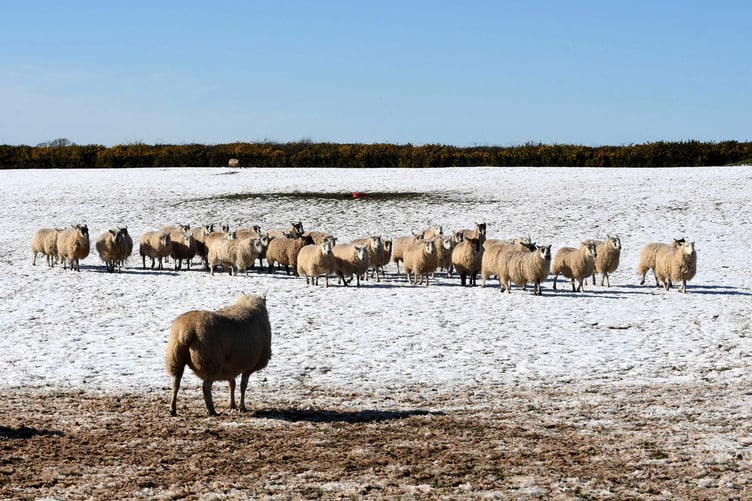The photo shows a peaceful scene at Ballakelly Farm, in Andreas, last week, with a flock of sheep enjoying some winter sunshine in their snowy fields.
But how many sheep on the Isle of Man are being terrorised by dogs running out of control, and what happens when farmers report a dog attack to police?
The Manx NFU has just released the results of a survey among sheep farmers to establish how bad the problem of so-called ‘sheep worrying’ is on the island. The results are concerning.
The survey, which was carried out in conjunction with the UK National Sheep Association, indicated that 82% of respondents had had at least one sheep-worrying incident in the past year, far exceeding what is reported to police.
It also reported that at least 26 sheep have been killed by dogs in the last year and at least 74 injured directly as a result.
Sarah Comish, general secretary of the Manx NFU, said: ‘It should be noted that the numbers are likely to be much higher than this. Many more have reportedly aborted lambs and in one case a flock of 110 sheep were attacked, with 7 of them very badly injured as a result of owners allowing dogs to run loose.’
Sarah went on: ‘Looking at deaths as a direct result, there’s death during the incident, which is slow, painful, savage and traumatic. There are then those unaccounted deaths happening after the event with sheep succumbing to injuries, trauma and stress, or aborting lambs.’
When asked to describe their thoughts and feelings following incidents of dog attacks on sheep, farmers said that it was traumatic, disturbing, horrendous and unnecessary, that it just should not happen, and that it was cruelty to cause such suffering.
Sarah said: ‘Dog attacks cause longer term suffering that will generally only be seen and experienced by the farmer and family.’
So what about the owners of these dogs?
How can they not be aware of the need to keep their dogs under control around livestock?
Sarah said: ‘The majority of incidents are from one or two dogs, that have either been left off the lead, and the owner has lost control, or are as a result of unaccompanied dogs that have been allowed to roam or have escaped from inadequately fenced domestic gardens.
‘Overwhelmingly, the feedback the MNFU has received indicates that either dog owners do not have the dog on a lead (68%), or do not believe that their dog is capable of attacking or worrying sheep (85%). Many incidents occur because of dog owners having a lack of regard, or an assumption that they will be able to control the dog, or often just allowing dogs to run free.
‘One farmer in the survey reported incidents occurring with people letting dogs out for a walk in a car park adjacent to their fields, but sitting in cars while dogs roamed free.
‘Farmers say that they are reluctant to approach dog walkers about putting dogs on leads, and if they do, most dog walkers refuse the request. Sometimes the farmer is ignored, and worryingly some experienced verbal abuse. On rare occasions this has become physically threatening and dog owners have sought retribution. Reports are also listed of gates, signage and land being damaged.’
One particularly serious situation, which is still ongoing, involves two Labrador-type dogs who have been seen by members of the public running loose around the time attacks on sheep were taking place.
On one occasion, one of the dogs was spotted running down the road covered in blood, a siting that has also been reported on Facebook.
Despite this, it is hard for the police to prosecute without firm evidence.
Sarah said: ‘Members of the public can help protect livestock by alerting police and the farmer of any incident they witness. They can provide vital evidence by taking photos or video footage of any sheep worrying, or loose dogs near livestock.
‘The MNFU advises calling the police and/or the farmer first, then trying to record as much evidence as possible.
‘Don’t intervene due to the risks of personal injury. It is a very distressing thing to witness, but gathering evidence is vital.’





Comments
This article has no comments yet. Be the first to leave a comment.